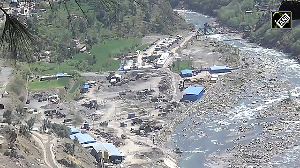'If attacks escalate, there is a risk the Suez Canal may be closed.'

Indian shippers are bracing for rising costs and increased vigilance as geopolitical conflicts have prompted an increasing number of shipping lines to avoid the Red Sea.
The Iran-aligned Yemeni Houthi militant group has launched drone attacks on cargo vessels in what it says are a response to Israel's assault on Gaza.
About 15 per cent of world shipping traffic transits via the Suez Canal, the shortest shipping route between Europe and Asia.
A senior official with the Directorate General of Shipping said the Centre is constantly monitoring the situation and had been issuing advisories for the safety of seafarers.
'All company security officers and masters of vessels are advised to be extra cautious, follow the practices, and take necessary precautionary measures,' the regulator said in a circular, seen by Business Standard, earlier this month.
According to industry estimates, ocean freight rates are up about 10 per cent as compared with last month.
"As this is an arterial route, the attacks pose a clear threat leading to disruption in the global supply chains once again. The world is just about recovering from a series of disruptive events, including the pandemic-inflicted lockdowns, the Russia-Ukraine war, followed by the Gaza conflict," a representative for the All India Liquid Bulk Importers and Exporters Association (AILBIEA) told Business Standard.
Four of the five world's largest container shipping companies -- Maersk, MSC, CMA CGM Group, and Hapag-Lloy -- have paused or rerouted movements through the Red Sea.
Oil major BP temporarily paused all transits through the Red Sea last week, a sign the crisis -- which has mostly affected goods freight until now -- might include energy shipments.
Norway-based oil tanker group Frontline also said its vessels would avoid passages through the Red Sea and the Gulf of Aden in the time ahead.
All ships transiting the Suez Canal have to sail through the Red Sea and the Gulf of Aden.
"If attacks escalate, there is a risk the Suez Canal may be closed. Most of the ships transiting the Suez Canal carry goods destined for Europe or the US, while good trade between Asia and Europe moves through the canal," AILBIEA said.
According to trade associations, there may not be an immediate impact, since ships would have exited that route.
Going ahead, however, there may be a 'temporary disruption' due to additional voyage time as ships will have to take the longer route via the Cape of Good Hope.
India uses the Red Sea route to send shipments to some parts of Asia, such as Egypt as well as northern Europe, to countries such as The Netherlands that may get impacted to some extent.
"As of now, there is no disruption to trade. There could be disruption if ships have to move via the Cape of Good Hope. If the situation persists, exports of items such as petroleum products and machinery may get affected," Ajay Sahai, director-general and CEO, Federation of Indian Export Organisations said.
"There is no specific information as yet about the fate of Indian goods to Europe or vice versa. The situation is evolving constantly," AILBIEA said.
London's marine insurance market has widened the area in the Red Sea it deems as high risk amid a surge in attacks on commercial ships.
With inputs from Shreya Nandi
Feature Presentation: Aslam Hunani/Rediff.com












 © 2025
© 2025